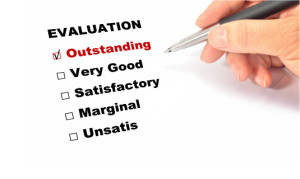Student Evaluations by Meggin McIntosh, PhD
 Student evaluations are a part of every faculty member’s life. Some consider them to be a positive part of the academic life and others dismiss them as a meaningless exercise (or even worse, as a detriment to good teaching).
Student evaluations are a part of every faculty member’s life. Some consider them to be a positive part of the academic life and others dismiss them as a meaningless exercise (or even worse, as a detriment to good teaching).
You might as well know that I come down on the side of student evaluations being a necessary and worthwhile component of teaching at the college and university level. I also received – and I believe, earned – great student evaluations over the 19 years that I taught undergraduate and graduate students. This wasn’t a fluke.
Here are my top ten tips for earning and receiving high evaluations from students:
- Teach well. You can’t get good student evaluations if you don’t first have this in place – so study the best teachers, access your teaching and learning center, evaluate your own teaching, just keep getting better and better. The best teachers are always seeking to be even better. Be one of those.
- Determine what you want students to write on your evaluations. For example, I wanted to students to write “I’ve never worked so hard in a class and I’ve never learned so much.”
- Tell students on the first day of class, “Here is what I am expecting to have you write on my evaluations at the end of the semester.” Then tell them.
- Teach and keep in mind whatever it is that you want students to write on your evaluations. The idea is that you are delivering on the “goods.”
- Begin doing course evaluations no later than the end of the third week of class.
- Figure out what is going well and what is not going so well right from the beginning.
- Ask for a faculty consultant from your teaching and learning center to observe you and give you feedback.
- Maintain high expectations for your students and yourself throughout the semester – including during the inevitable wax and wane of energy and attention that tends to come about the 8th or 9 th week into a 15-week semester.
- Prior to your official course evaluation, tell the students that you appreciate their professionalism and respect of this process. Make it clear that you will read all of their evaluations with care.
- Avoid listening to colleagues who dismiss teaching evaluations. If you are getting good ones, they will try to make it a bad thing (because they aren’t getting good ones). If you are getting not-such-great ones, they will try to indicate that it has nothing to do with you, but rather it’s the wretched students, the lowering of the standards, blah, blah, blah. In fact, if we are getting poor student evaluations, we need to take a look at what is happening and work to improve. Don’t get sucked in by colleagues who don’t value teaching and don’t value improvement of our teaching skills – which will show up on your evaluations.
© Meggin McIntosh, PhD | Emphasis on Excellence, Inc. | www.meggin.com
My belief is that we all have more control than we think we do…at least over those items that I’ve listed above. Be thankful for the control you have and use it in a productive manner.
Do you have questions or topics that you would like me (or a guest author) to address in future Top Ten Productivity Tips for Professors? Then just send an email to meggin@TopTenProductivityTips.com and I will endeavor to get an answer to you and others in a timely fashion. Your questions are likely to be on others’ minds, too, so help everyone by sending me your questions and suggestions.
Feel free to forward this email in its entirety to your colleagues, friends, and family. They may also want to subscribe and receive their own weekly Top Ten Productivity Tips (from any one of the 8 different specialized series). It helps all of us be more productive when the people around us are also productive!
© 2004 – 2012 Emphasis on Excellence, Inc. All Rights Reserved





